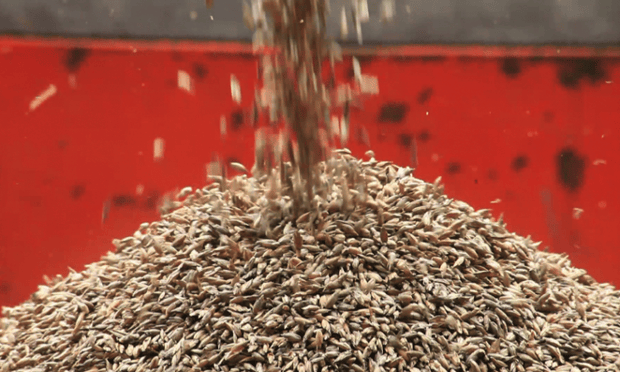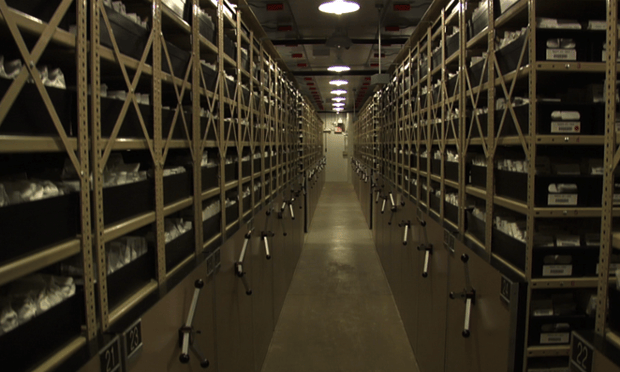Seeds of Time - preserving food resources in a hot future climate
Posted on 22 May 2015 by John Abraham
So often, we talk about “proving” climate change is happening, or articulating changes we expect in the future from increased extreme weather. We should also talk about adaptation - how can we adapt to a future climate?
A recent film, being shown in theaters in New York City now and Los Angeles next Friday is a great success story about adaptation; decisions we can make now that may influence the fortunes of future generations. The movie, called Seeds of Time, is directed by Oscar-nominee Sandy McLeod. It is narrated by Dr. Cary Fowler who identifies the challenges agriculture will face with climate change and other potential disasters. Cary was former Executive Director of the Global Crop Diversity Trust. Their goal was to put together an international plan to preserve global genetic diversity.

Photograph courtesy of Ian Savage.
Why is it important to preserve our future food resources? Well in today’s climate, food production is susceptible to extreme weather swings, particularly droughts and floods. Here in the United States, we are suffering through the third major drought since 2011. The costs to this country are billions of dollars. The current California drought is the worst in over 1,200 years.
While the west coast dries, other parts of the US are experiencing flooding as our weather swings from one extreme to another. It isn’t just the United States, elsewhere around the planet similar extremes are being observed. I’ve seen firsthand the impact of extreme weather on subsistence food production in Africa. It isn’t pretty.
While politicians, political scientists and industry lobbyists may deny the connection between climate change and extreme weather, the physical scientists know better. Joining the scientists, Dr. Fowler’s main goal is to create a food-production system, which is sustainable, one that can navigate the present and future threats facing it. A major step in his effort is the safeguarding of the genetic diversity of today’s crops in large vaults where seeds can be stored for future use.
Cary is informed by past crop failures which have led to downfalls of other cultures. Those past cultures have not had the knowledge and resources that we have, attributes that should enable us to preserve food diversity. Maintenance of crop diversity is particularly challenging in an age of industrial agriculture. Today’s practices focus on monocultures that while productive, are susceptible to catastrophic loss.
What would happen if a major disease or disaster decimated today’s crops? It isn’t far-fetched. Cary discusses how recent crop disease, such as the 1999 wheat stem rust could present a major risk to world-wide monoculture productivity.
In addition to diseases and other risks, climate change presents a unique challenge. The changing climate will present a whole new set of risks to today’s agriculture that haven’t been present in the past decades.
The vault which is located in Svalbard Norway is like an insurance policy. It is located in a remote and cold environment. It is the largest and most secure collection of crop diversity in the world. It holds 190 of the world’s most important food crops. Its location makes it immune to changes to climate for the foreseeable future. Many of the seeds can be stored for thousands of years in this site.

Inside a seed bank. Photo courtesy of Tom Parkin.
In his narration, Cary opines - if we can spend money and time saving banks, financial institutions, or other corporate entities, why not save valuable and non-replaceable genetic resources? I couldn’t express it better. This is a great example of being penny-wise. A simple cost-effective way to preserve the enormous value of agricultural genetic diversity. I expect that as the impacts of climate change become clearer and clearer, we will find more Dr. Fowlers who champion efforts to preserve our quality of life for future generations. He told me,































 Arguments
Arguments






























Can the same be done to preserve animal cells?
With the Cold War slowly coming out of hibernation, I hope these vaults have some warming provision to ensure that the conditions remain above freezing point for those seeds that would be susceptible to a nuclear winter should the worst come to the worst.
The norway project is a good way to preserve the actual genes. However we need to take a mass scale to do the same with food. E.g. Store several year's grain supply.
This goes against the whole "Just in Time" system in industry. Look instead to collecting pools of resources that can be used later. Inventory, instead of being a liability should be an asset — subject to re-valuation as times change.
If you are going to store 7 years grain supply, you need massive silos, good pest control, and possibly controlled atmosphere conditions. All costs money. On the other hand, companies that do this are in a position to gain on the arbitrage between bounty years and lean years.
Probably quite doable with minor changes to tax laws — make it easier to write off storage costs, including lost revenue for tied up capital.
"Many of the seeds can be stored for thousands of years in this site."
Mmm, I think that's only if industrial civilisation lasts that long. The cooling does rely on chillers to get down to the temperatures required for that long term cooling. And will the seeds be accessible if some catastrophe does happen (which is why it was built, after all)?
Scientists write very little on how many humans will die this century and the next due to global warming and its climate change. Much more is written on the impacts of global warming on animal and plant diversity and extinction.
World food stores are at the 70-90 days of consumption level, while basic food prices are down from their peak several years ago. UN population projections have increased to 11 billion humans living on Earth in the year 2200. But, the agricultural yield per acre has actually been decreasing since 1980 for most crops. Soil fertility is also decreasing, not increasing. Seas will certainly flood many fertile river deltas. Many current agricultural regions are projected to become desert or semi-desert this century.
Global warming gases are already at extremely high levels. While science has dramatically lowered the cost of renewable energy, fossil fuel consumption keeps breaking records year after year. Granted that human efforts to stem global warming emissions seem to be increasing, much greater progress was made way back in 1990 with the Kyoto Protocol only for emissions to get much worse instead of better.
I think it is time for scientists to start making reasonable projections on future food prices and on human deaths due to starvation. While Hansen long ago suggested that the Earth may only be able to sustain 1 billion living humans, I have seen no scientific articles in years on this issue. While fossil-funded deniers would attack any truly pessimistic scientist projecting billions of deaths, e.g., 25 million or more per year, year after year, it would help wake people up. That's killing more people than World War II year after year after year.
Mike Berners-Lee in "How Bad Are Bananas" guesstimates that for every 150 tons of CO2 now put into the atmosphere, one more human will die this century. That means that the average American is killing one person every 10 years and that the average European and average Chinese is killing one person every 15-20 years. We need published research on this issue. We need to ourselves start living our lives as if our own pollution is actually killing other humans.
My person guide is that one mile driven in my Chevy Sonic emits 1# CO2 which deprives one other human somewhere this century of 1 hour of life. I have turned off my water heater, buy wind electricity, eat inexpensive vegan home cooked from scratch, given up flying, vacation locally, unheated bedroom, etc. As soon as I can buy a Nissan Leaf and install PV solar, I will. I have a moral duty to become carbon neutral as soon as humanly possible.
I think that evidence is clear that death is rushing at us. I think that scientists are afraid of being personally attacked for documenting the evidence for this. We need to wake up. Carbon neutral now, not in 2040!